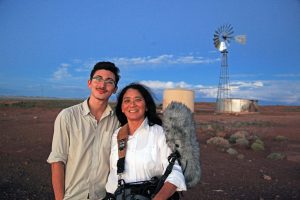Claudia Katayanagi
Veteran sound mixer brings the 664 mixer/recorder on-set for her directorial debut of the award-winning documentary, A Bitter Legacy.
SAN FRANCISCO — Claudia Katayanagi has had a long career in sound mixing and recording that has taken her on location with HBO documentaries, including the acclaimed Food, Inc., Crude and Paradise Lost 3: Purgatory, PBS’ Frontline, and the BBC’s arts-focused Imagine series. She has also made dozens of programs for San Francisco’s public media station KQED, and worked on the second and first units of feature films.
“I generally record dialogue for films, documentaries, and corporate shoots,” says Katayanagi, “But like all sound recordists on these types of projects, ambient sound is a delight to record. Surf sounds in stereo are always one of my favorites, as are bell towers and train stations all over the world.”

A convert to Sound Devices’ portable recording and mixing equipment when the products first appeared on the market, Katayanagi owns a Sound Devices 302 three-channel field mixer, a 744T four-track audio recorder, and a 664 12 input, 16 track field production mixer.
Katayanagi bought the 664 mixer just a few months after it was first introduced, a decision made much simpler by her prior exposure to the brand. “Owning the previous Sound Devices mixers made for an easier transition to the 664,” she adds. “I knew how important all its capabilities were going to be and now I feel as though I have a mini computer in the guise of a mixer/recorder on location. The numerous permutations of input to output selections have been invaluable for so many different types of shoots.”
Her favorite Sound Devices gear is still by her side and proved instrumental in her first turn as a feature documentary director, a project she has worked on for the past five years. Her new film, A Bitter Legacy was recently awarded “Best Documentary” at the Women’s Independent Film Festival. The project, recounts the concentration camps created by the United States government to confine Japanese Americans and others of Japanese ancestry during World War II. The film focuses on the lesser-known, essentially secret isolation outposts that served as concentration camps for the more vocal among those incarcerated. These “more harsh prisons,” says Katayanagi, were “for those who stood up, spoke up and resisted what they saw to be an injustice.”
Given her limited resources as a first-time director, Katayanagi is also the documentary’s producer and its primary location sound mixer. “During interviews, I would set up the boom and a lav mic on talent, and with my headphones on, I would conduct the interviews for hours at a time,” she says. “Knowing how well the 664 performed, I simply had to trust my ears as I directed the interviews, and several times, a re-enactment.”
She particularly enjoyed hearing the final product as a member of the audience during the film’s screenings. “I recently got to see and hear my film played in a theatre with a THX sound system for the first time and I was so blown away by how good my film sounded,” she says. “I give a large amount of credit to my Sound Devices 664, and to my sound editor and mixer, Philip Perkins.”
A Bitter Legacy screened in April 2016 at the Arizona International Film Festival and Vail Film Festival. To learn more about Katayanagi’s film, visit www.abitterlegacy.com/.